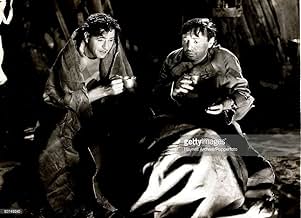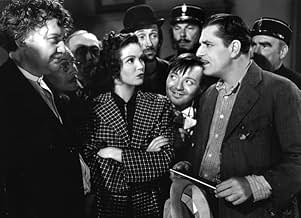Ajouter une intrigue dans votre langueAfter saving a tramp from suicide, a millionaire takes his clothing and disappears. Word is out that he will give a million francs to anyone who is kind to a tramp.After saving a tramp from suicide, a millionaire takes his clothing and disappears. Word is out that he will give a million francs to anyone who is kind to a tramp.After saving a tramp from suicide, a millionaire takes his clothing and disappears. Word is out that he will give a million francs to anyone who is kind to a tramp.
- Réalisation
- Scénario
- Casting principal
Avis à la une
This is another turn on the 'rich guy goes hobo' routine, but it's grand fun. Millionaire Warner Baxter tires of all the hangers-on; when he saves tramp Peter Lorre from drowning, he switches clothes and tries out life with no dough. But Lorre tells the press that there's a millionaire dressed as a tramp who's going to give someone a million francs just for being nice to him. So the whole French town takes in all the tramps and gives them everything. Meanwhile, Baxter falls in -- and falls in love with -- Marjorie Weaver at the local circus. Lorre gives one of his best performances; and when he teams up with fellow tramp John Carradine towards the end, it's a match made in heaven. I'd watch a whole movie starring those two guys in those two roles! Baxter is just fine -- if a tad long in the tooth -- in the lead. Weaver is a fresh face; and the cast is full of wonderful faces and wonderful actors. Check this rarity out if it comes your way.
I'll Give A Million is the proposition that Warner Baxter after being disillusioned that people are only interested in him for his money gives to Peter Lorre after he jumps off his yacht to save him from drowning. While they're asleep Baxter changes clothes with Lorre and also leaves many francs in his coat pocket.
As a tramp he's befriended by Marjorie Weaver and her uncle Jean Hersholt who run a small circus.
In the meantime Lorre attired in Baxter's abandoned evening wear gives the story to the newspaper that somewhere lurking in this French Riviera town is a tramp who's really a millionaire. The forgotten men of France descend on the town like a plague of locusts hoping to be treated well if people think they are incognito millionaires.
I'm guessing Tyrone Power and Don Ameche were otherwise occupied so Warner Baxter got the lead. A bit older than the other two he does nice as the weary cynical millionaire. Lorre is a fine figure as the tramp who can't believe his good fortune which rapidly becomes a curse as the hunt for the incognito millionaire intensifies.
A good screwball comedy from 20th Century Fox in that age of the screwballs, the Thirties.
As a tramp he's befriended by Marjorie Weaver and her uncle Jean Hersholt who run a small circus.
In the meantime Lorre attired in Baxter's abandoned evening wear gives the story to the newspaper that somewhere lurking in this French Riviera town is a tramp who's really a millionaire. The forgotten men of France descend on the town like a plague of locusts hoping to be treated well if people think they are incognito millionaires.
I'm guessing Tyrone Power and Don Ameche were otherwise occupied so Warner Baxter got the lead. A bit older than the other two he does nice as the weary cynical millionaire. Lorre is a fine figure as the tramp who can't believe his good fortune which rapidly becomes a curse as the hunt for the incognito millionaire intensifies.
A good screwball comedy from 20th Century Fox in that age of the screwballs, the Thirties.
20th Century-Fox did this Hollywood remake of a 1935 Italian film of the same translated title, the setting switched to the South of France, featuring a cast filled with contract players led by Warner Baxter ("The Prisoner of Shark Island"). His character, Tony Newlander, is the millionaire tiring of the sycophants around him, none of whom he can rely on as a trusted friend, who rescues a drowning man known as Louie 'The Dope' Monteau (Peter Lorre), a homeless derelict. Tony would be happy just to find one person who could befriend him without the promise of monetary gain, leaving Louie a million dollars for his troubles. Once the newspapers publish a story claiming that a millionaire is masquerading as a bum, a fortune awaiting the person who shows him any kindness, the entire city is quickly overrun with derelicts looking for handouts, while Tony finds himself falling for an impoverished circus performer (Marjorie Weaver) with a trained chimp named Darwin, who excels at judo and cigarette smoking. Amidst the Moto series, Peter Lorre thoroughly enjoys this comic change of pace, joined in mischief during the latter stages by John Carradine's Kopelpeck, resplendent in top hat and cane. Among the many familiar faces are Fritz Feld, Jean Hersholt as a clown, and Frank Reicher as the Prefect of Police, who himself takes in a bum off the street and ends up getting robbed.
An amiable, workmanlike farce that's like "My Man Godfrey" without the archness, this Hollywood studio product has an unusually European flavor, perhaps due to the number of newly arrived Holocaust refugee actors in its cast. Especially worth seeing for Peter Lorre's engaging turn as a kittenish hobo.
This film starts out with great promise. Tony (Warner Baxter) is a wealthy man, out on his yacht, who suddenly becomes aware that everybody onboard is just nice to him because of his money. As he stands leaning over the railing of the yacht, pondering this fact, he notices a man yelling for help, apparently drowning in the ocean. His yells of man overboard are not heard, so he jumps in and rescues the man. The yacht is out of range, so he swims to shore with Louis (Peter Lorre) in tow.
They camp on the beach for the night, and Tony tells Louis that if he could find just one person who was nice to him and not expecting a payout that he would give that person one million francs (today one dollar = 5 francs). The next day Louis awakens and finds Tony gone but his clothes and money still there. He goes into town wearing Tony's clothes and spending Tony's money. This gets the attention of the police, where Louis tells the story of the rich man, incognito dressed like a tramp, who will give one million francs to anybody who does a good deed for him with no expectations of reward. Soon everybody is being nice to all of the hobos. Meanwhile, Tony has become friends with a woman in a circus who knows nothing about this . Complications ensue.
Now all of this sounds pretty good, but it just seems to bog down a bit after Tony and Louie separate. A 1930s Fox screwball comedy is a rarity, and there is a reason for that. This would have been even better and probably ringed a bit truer if it had been made over at Warner Brothers, retaining the natural performance of Baxter as the millionaire and Lorre as the impish tramp and maybe using some of Warners' great contract players to fill in the blanks.
Still, it is funny and like "My Man Godfrey" has something to say about how your pocketbook often dictates your treatment by your fellow man towards the end of the Great Depression. A rare message-comedy from Fox.
They camp on the beach for the night, and Tony tells Louis that if he could find just one person who was nice to him and not expecting a payout that he would give that person one million francs (today one dollar = 5 francs). The next day Louis awakens and finds Tony gone but his clothes and money still there. He goes into town wearing Tony's clothes and spending Tony's money. This gets the attention of the police, where Louis tells the story of the rich man, incognito dressed like a tramp, who will give one million francs to anybody who does a good deed for him with no expectations of reward. Soon everybody is being nice to all of the hobos. Meanwhile, Tony has become friends with a woman in a circus who knows nothing about this . Complications ensue.
Now all of this sounds pretty good, but it just seems to bog down a bit after Tony and Louie separate. A 1930s Fox screwball comedy is a rarity, and there is a reason for that. This would have been even better and probably ringed a bit truer if it had been made over at Warner Brothers, retaining the natural performance of Baxter as the millionaire and Lorre as the impish tramp and maybe using some of Warners' great contract players to fill in the blanks.
Still, it is funny and like "My Man Godfrey" has something to say about how your pocketbook often dictates your treatment by your fellow man towards the end of the Great Depression. A rare message-comedy from Fox.
Le saviez-vous
- Anecdotes"I'll Give a Million" was based on a 1936 film of the same name with Vittorio De Sica, whom Fox unsuccessfully tried to recruit for this remake.
- GaffesWarner Baxter was 5'11", Peter Lorre was 5'3", yet there exchanged clothing fit each other perfectly.
- ConnexionsRemake of Je donnerai un million (1935)
Meilleurs choix
Connectez-vous pour évaluer et suivre la liste de favoris afin de recevoir des recommandations personnalisées
Détails
- Durée
- 1h 10min(70 min)
- Couleur
- Rapport de forme
- 1.37 : 1
Contribuer à cette page
Suggérer une modification ou ajouter du contenu manquant



































